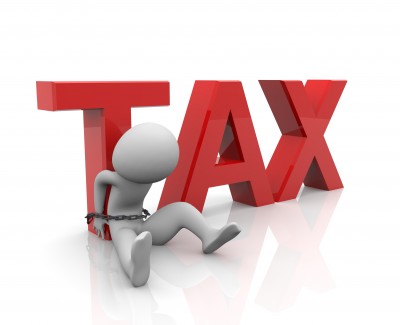UPDATED JANUARY 2024
You’ve probably heard the old joke about the guy who hears a knock on his door, opens it, and there’s a man who says…
I’m from the IRS and I’m here to help you!”
Well, there are times when the IRS is trying to help you… and when it comes to the Bank On Yourself method, there are at least five ways they do that.
With the caveat that I’m not a CPA or accountant, nor have I ever played one on TV, here are five ways Bank On Yourself could save you thousands or even hundreds of thousands of dollars in taxes over your lifetime…
Bank On Yourself Tax Advantage #1: Tax-Free Retirement Savings Withdrawals
Many people love saving for retirement in tax-deferred accounts like 401(k)s, IRAs, 403(b)s, Profit Sharing plans and so on. But what direction do you think tax rates will go over the long term?
Given our country’s skyrocketing debt (see for yourself here), aging demographics, and the government’s “tax-and-spend-on-steroids” policies, most people agree that tax rates are likely to go up over time.
If that happens, and you’ve been successful growing your nest-egg, you’re only going to pay higher taxes on a bigger number! That means you’re sitting on a tax time bomb!
In Chapter 5 of my New York Times best-selling book, The Bank On Yourself Revolution, I give an example of retired brothers Bob and Bill, who are both in the 35 percent tax bracket (and each has an average tax rate of 28 percent). Bob takes $100,000 per year in retirement income from his Bank On Yourself plan, with no taxes due.
Bill takes $100,000 per year in retirement income from his tax-deferred plan. However, because Bill has to pay income tax on his income, he ends up with only $72,000 per year to spend. The rest – $28,000 – goes to the government. If Bill wants an after-tax income that equals Bob’s, he will have to withdraw more – about $139,000 – and send 28 percent of it to the IRS. Only then will Bill have $100,000 to call his own.
Paying your taxes up front while you know what they are, and then having no taxes due on your gains, avoids unwelcome surprises.
Are you basing your retirement security on variables you can’t possibly predict or control?
Most Americans are. Government-sponsored tax-deferred plans have two key unknowns:
- What will your retirement account be worth on the day you plan to tap into it? And…
- What will the tax rates be during your retirement?
Do you know the answers to either of those questions with any degree of certainty?
If you don’t – and most people who save and invest the conventional ways can’t answer these questions – how can you call what you have a financial “plan”? It’s a crapshoot – pure and simple.
So, how are you able to access the growth in a Bank On Yourself policy with little or no taxes due on it?
In a nutshell, your cash value in a Bank On Yourself-type policy grows in two main ways. First, you receive a guaranteed, pre-set annual cash value increase.
 And second, you have the potential to receive dividends. These dividends aren’t guaranteed; however, the companies recommended by the Bank On Yourself Professionals have paid dividends every single year for more than 100 years running. (That includes during the Great Depression, every recession and every market crash.)
And second, you have the potential to receive dividends. These dividends aren’t guaranteed; however, the companies recommended by the Bank On Yourself Professionals have paid dividends every single year for more than 100 years running. (That includes during the Great Depression, every recession and every market crash.)
A Bank On Yourself policy is taxed more like a Roth-type plan (but it doesn’t have the restrictions of a Roth plan). You pay taxes before you make your contribution (when you know what your tax rate is!), and you can pull out both your principal and gains tax-free, if you follow some simple guidelines.
Under current tax law, dividends you leave in your policy aren’t taxable. Dividends you withdraw aren’t taxed until they exceed your “cost basis” (the premium you paid in), at which point you can switch to borrowing against your cash value with no taxes due on policy loans.
That’s how you can get your hands on the equity and growth in your Bank On Yourself policy without owing taxes.
Note: If you surrender or lapse the policy, you could end up owing taxes on your gains.
What if the tax laws change?
They could change the tax laws, of course, just as they can for all retirement plans, including Roth plans. But the tax benefits of a Bank On Yourself plan are an extra. Even if they disappeared, the Bank On Yourself method stands on its own and you’d still get all the other advantages and guarantees unique to this method.
Which is why the $100,000 cash reward I’m offering to the first person who can show they use a different product or strategy that can match or beat Bank On Yourself still remains unclaimed.
Below are four more tax advantages of Bank On Yourself…
HOW TO ADD GUARANTEES AND PREDICTABILITY TO YOUR FINANCIAL PLAN…
Would you like to find out how big your nest-egg could grow – guaranteed – if you added Bank On Yourself to your financial plan? No two plans are alike – yours would be custom-tailored to your unique situation, goals and dreams. To find out what your bottom-line numbers would be, request a FREE, no-obligation Analysis today.
If you’re wondering where you’ll find the money to fund your plan, keep in mind the Bank On Yourself Professionals are masters at helping people restructure their finances to free up money to fund a plan. Here are the eight most common places they look.REQUEST YOUR
FREE ANALYSIS!
Bank On Yourself Tax Advantage #2: Reduce the Taxes You’ll Pay on Your Social Security Benefits
Most people aren’t even aware that it’s common to owe taxes on your Social Security benefits. Currently, if a couple makes over $32,000 (from retirement account withdrawals and other sources), 50% of their Social Security income gets taxed.
If a couple retires with an income above $44,000, up to 85% of their Social Security benefits are taxed!
48% of Americans already pay taxes on their Social Security benefits, according to the SSA. And because the cutoff isn’t benchmarked to inflation, more and more beneficiaries will soon be subject to the tax.
However, the income you take in retirement from a Bank On Yourself policy is NOT included in the income totals the IRS uses to determine whether – and how much – your Social Security check is taxed.
As an interesting note, the biggest complaint we’re hearing today from seniors who’ve managed to accumulate some assets is that they’re being forced to take the Required Minimum Distribution (RMD) from their retirement or pension plan, once they turn age 73.
Yes, that’s one of the many strings attached to those government-sponsored plans.
The government requires this because they can’t afford to wait any longer to start collecting those taxes they let you defer all those years. But the other effect the RMD has for many retirees is that it causes them to have to pay higher taxes on their Social Security benefits!
Tip: Don’t get suckered into believing you control the money in your 401(k) or IRA, etc. The government controls it and can (and does) change the rules any time they want! In fact, they made a number of changes at the end of 2022 – and you had no say in it!
Bank On Yourself Tax Advantage #3: Qualify for More College Federal Student Aid
 While this is not technically a tax benefit, it’s similar to the last advantage in that funds that are sitting in the cash value account of a Bank On Yourself whole life policy do not count against your kids when they apply for federal student aid.
While this is not technically a tax benefit, it’s similar to the last advantage in that funds that are sitting in the cash value account of a Bank On Yourself whole life policy do not count against your kids when they apply for federal student aid.
These funds are not reported as assets on the Free Application for Federal Student Aid (FAFSA) form, which means your chances for scholarships and financial aid are higher.
Learn about how more and more people are using the Bank On Yourself method to save for college without going broke.
Bank On Yourself Tax Advantage #4: Tax Benefits for Business Owners
Business owners and professionals are increasingly using Bank On Yourself to become their own source of financing for business vehicles, equipment, office buildings and more. When you finance business expenses this way, you can get tax deductions for interest and depreciation. Plus it lets you recapture the interest you’d otherwise pay to banks and other financial institutions.
This video shows you how it works.
Bank On Yourself Tax Advantage #5: Leave a Larger Financial Legacy
One of the most valuable (and most under-appreciated) benefits of a Bank On Yourself-type policy is the death benefit. Just like the cash value, the death benefit of a properly structured policy grows by an exponentially increasing amount.
The death benefit – which is likely to be many times larger than the amount you’ve saved up – passes to your loved ones and/or favorite charities income-tax free, under current tax law. That won’t happen with traditional retirement plans.
There you have it – five tax advantages of the Bank On Yourself method.
The ultimate financial security blanket
Did you know that the Bank On Yourself wealth-building method has NEVER had a losing year? Used by Walt Disney, J.C. Penney, and millions of other people, it has stood the test of time for more than 160 years.
To find out how you can grow your nest-egg safely and predictably, even when stocks real estate and other investments tumble… and how much money you could have – GUARANTEED – on the day you plan to retire, request your FREE no-obligation Analysis and Recommendations now.REQUEST YOUR
FREE ANALYSIS!


I have a Bank on Yourself Plan. Now I have some questions. When the man in the story you told took out $100,000 dollars a year was he then charged interest on that money?
Also I wonder if some more money comes up than is the required payment can it be put into the plan advantageously? Or would it be better to get another plan to put excess money into?
Chandler
Yes, you pay interest on policy loans, but with a Bank On Yourself-type plan, the interest you pay ultimately benefits you, the policy owner. See our consumer Guide to Policy Loans to learn how that happens.
As to the best way to add funds to your policy, that’s going to depend on several factors, so I recommend you contact your Bank On Yourself Professional for advice on that.
I would like to see if it’s too soon to get an analysis. I was assigned to an agent named Scott many years ago but then became homeless. I will be 56 years next year. I’m cleaning up debt and will be able to save at least $700 per month.
I also am interested in starting a small business and would like to figure out how much I can make using the tax benefits that BOY would allow me. I can make around $1000 extra without danger of loosing compensation. So, also wondering if there are ways for doing taxes so that I can make a little more each month gradually. I don’t see that I could ever be working in a full-time status. Thank you.
Please complete the Analysis Request Form here.
I am having trouble determining how much income can be generated from a policy in retirement so as to keep the policy from lapsing. I understand you can pull a combination of dividends, cash value increases and loans for the income. However, it would be very helpful if you could post a hypothetical illustration of how a retiree would approach this from say 65-90 and still not go lapse with compounding interest if the retiree lives past 90.
Since no two policies are alike, it wouldn’t help you to see an example of someone else’s policy.
A Bank On Yourself Professional can show you how a custom tailored Bank On Yourself plan can help YOU reach your financial goals and dreams without taking unnecessary risks.
You’ll see the bottom-line guaranteed numbers and results you could get if you implemented this strategy. You can request a referral to a Professional and take advantage of a free, no-obligation Analysis here.